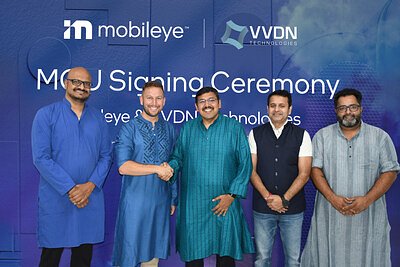
India Drives Local ADAS Revolution: Mobileye & VVDN Partnership Boosts Safety & Supply Chains
A new collaboration between Mobileye and Indian manufacturer VVDN Technologies aims to localize advanced driver-assistance systems, strengthening India's automotive tech sector and reshaping global supply chains.
India Drives Local ADAS Revolution: Mobileye & VVDN Partnership Boosts Safety & Supply Chains
Fremont, CA / Gurgaon, India – November 8, 2025 – In a move signaling a significant shift in the automotive technology landscape, Mobileye and VVDN Technologies have announced a strategic partnership to localize the manufacturing of advanced driver-assistance systems (ADAS) in India. The collaboration aims to not only enhance road safety within the country but also position India as a key player in the global automotive supply chain, reducing reliance on often-volatile international markets.
Mobileye, a leader in ADAS and autonomous driving technology, is partnering with VVDN Technologies, a rapidly growing Indian electronics manufacturing services (EMS) provider, to establish a localized production hub for critical ADAS components and systems. This move comes amidst increasing global emphasis on supply chain resilience and a growing demand for safer vehicles, particularly in emerging markets like India.
A Rising Tide of Localization
This partnership is far from an isolated event. It’s part of a larger trend toward localization within the automotive industry, fueled by geopolitical uncertainties, disruptions caused by events like the COVID-19 pandemic, and a desire to reduce logistical costs. “We’re seeing a clear move towards regionalizing manufacturing,” explains a supply chain analyst familiar with the automotive sector. “Companies are realizing the risks of relying on single sources of supply, especially for critical components.”
The Indian government’s “Atmanirbhar Bharat” (Self-Reliant India) initiative, along with Production Linked Incentive (PLI) schemes, are providing further impetus to this trend. These policies offer financial incentives to domestic manufacturers, encouraging them to ramp up production and reduce dependence on imports. “The government is actively fostering a domestic ecosystem for automotive technology,” adds the analyst. “This partnership between Mobileye and VVDN aligns perfectly with that vision.”
Boosting Road Safety in India
India faces a significant challenge in terms of road safety, with a disproportionately high number of accidents and fatalities. According to the World Bank, India accounts for approximately 11% of global road traffic deaths, despite having only 1% of the world’s vehicles. The introduction of advanced driver-assistance systems, such as automatic emergency braking, lane departure warning, and adaptive cruise control, has the potential to dramatically reduce these numbers.
“Localized production will make these safety features more affordable and accessible to a wider range of vehicles in the Indian market,” notes a road safety advocate. “Currently, many of these technologies are only available in high-end cars. Bringing down the cost through domestic manufacturing will be a game-changer.”
VVDN’s Ascent & The Growth of Indian EMS
The selection of VVDN Technologies as Mobileye’s partner is a testament to the growing capabilities of the Indian EMS industry. Once primarily focused on low-cost manufacturing for consumer electronics, Indian EMS providers are now moving up the value chain, offering more sophisticated engineering and manufacturing services.
“VVDN has been aggressively investing in advanced manufacturing capabilities and building a strong team of engineers,” explains a source familiar with the company. “They’ve demonstrated a track record of successfully delivering complex projects for global clients.”
The company’s facilities, equipped with state-of-the-art equipment and adhering to international quality standards (ISO 9001, ISO 14001, ISO 45001), are strategically located to serve both domestic and international markets. “This partnership isn’t just about Mobileye gaining access to a manufacturing hub; it’s about VVDN solidifying its position as a key player in the global EMS landscape,” the source added.
Reshaping Global Supply Chains
The implications of this partnership extend beyond the Indian market. By diversifying its manufacturing base, Mobileye is reducing its reliance on potentially vulnerable supply chains. This move is part of a broader trend among automotive manufacturers to build more resilient and geographically diverse supply chains.
“The automotive industry has learned a hard lesson from recent disruptions,” explains a supply chain expert. “Companies are realizing that single-sourcing and over-reliance on specific regions can be disastrous. Diversification is key.”
This partnership is expected to create a ripple effect, attracting other automotive technology companies to invest in India and establish local manufacturing operations. “India has the potential to become a major hub for automotive technology manufacturing and innovation,” says the expert. “This partnership between Mobileye and VVDN is a significant step in that direction.”
Looking Ahead
The localization of ADAS manufacturing in India is poised to benefit all stakeholders – consumers, manufacturers, and the Indian economy. By enhancing road safety, strengthening supply chains, and fostering innovation, this partnership is driving a positive transformation in the automotive technology landscape.
While challenges remain – including the need for skilled labor and robust infrastructure – the long-term prospects for the Indian automotive technology sector are bright. As India continues to invest in its manufacturing capabilities and embrace innovation, it is well-positioned to become a global leader in the automotive industry.
“This is just the beginning,” concludes the supply chain analyst. “We can expect to see more and more automotive technology companies investing in India and establishing local manufacturing operations in the years to come.”
